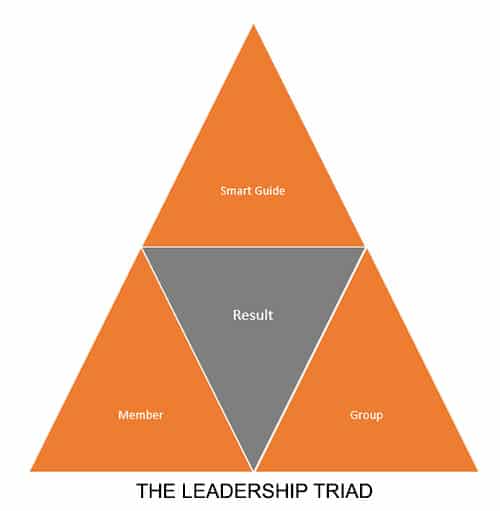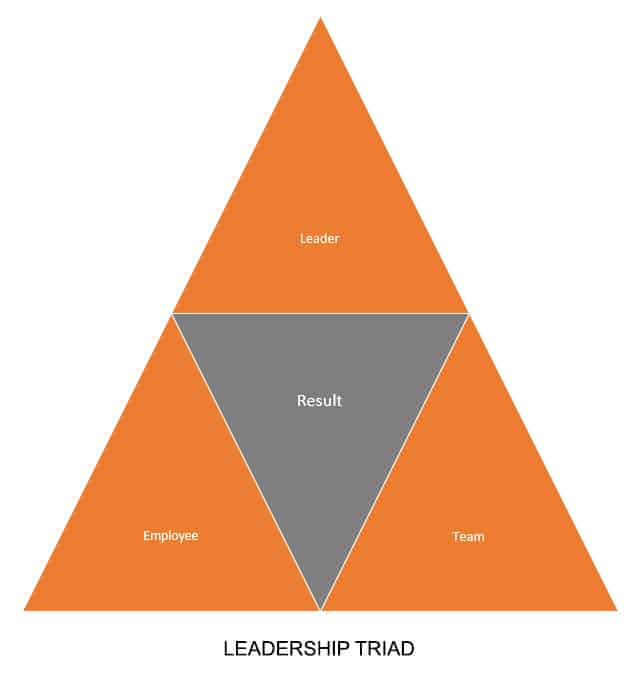The Future Ready Triad and Why It Matters More Than Ever

Triads are a fascinating construct. They are also an important model to consider when it comes to assuring that you and your employees are future ready. Everything happens in threes, right? Why not future readiness? Years ago, Tribal Leadership coauthor Dave Logan talked to me about why triads are more effective than dyads when it comes to forming small work teams to handle specific projects. Among many reasons, two people can be prone to agreeing on a plan of action at the expense of considering other options, while three people will typically engage in a more thoughtful dialogue about their approach to completing the task.
In writing The Power of Peers, we consulted Dave Logan to consider triads beyond three individuals and to imagine the triad inherent in a peer group dynamic: 1) Smart guide/group leader, 2) the individual member, and 3) the group as a whole.
Two things became clear as we explored the model in this context. First, leaders are most effective when they are part of the group as opposed to being apart from it. When leaders see themselves as part of the group, they can set the example, or as authors of The Leadership Challenge, Jim Kouzes and Barry Posner say, they can “model the way.”
Second, it illustrates that the leader, the group, and the individual group member all have shared responsibility for achieving whatever result one wants to put in the middle of the triad – productivity, tangible outcomes, fun, healthy culture, etc.

If you apply this construct to a team and consider the findings from the 2019 Edelman Trust Barometer (Trust at Work), it offers some guidance for both the value and the approach a CEO should consider when it comes to being future ready in a rapidly changing world.

The Value
In describing the Edelman Trust Barometer’s findings in terms of implications for the employee experience, there are several noteworthy data points:
- People are worried about their jobs. “They are worried about their jobs, and how their jobs will be affected by innovation. Among people who are employed, the majority are worried about losing their jobs due to automation, falling behind in career training, and about the international conflicts surrounding tariffs and trade policies. These concerns are even more pronounced among employees of multinationals, who are exposed to not only technological and political changes, but often face frequent organizational restructuring and other business transitions” (Edelman, 2019).
- Seventy-nine percent of prospective employees expect employers to provide training. In a world where people realize they risk losing their jobs to either automation, consolidation, or outsourcing, they expect employers to play an active role in helping them be future ready.
- Employees are more than willing to do their part. Sixty-seven percent of US employees believe that having a successful career is up to them. Twenty-four percent regard this as a joint responsibility with their employer, and only 9% consider it the employer’s responsibility. Being successful means staying current.
- People learn better when they learn together. “When you study alone, you typically remember 28% of what you learned after two days. When you repeat the material, you remember 46%. But when you use it, answer questions about it, and interact with others, you remember 69%. The reason? Actually conceptualizing, recalling, and using information is what creates the ‘memory pathways’ that stick in your mind” (Josh Bersin, May 19, 2019).
- Employees trust one another. Edelman also notes that while they look to their CEO to lead through these uncertain times, employees tend to get most of their company related information from informal interaction with other employees. When one factors trust into the mix, employees trust their peers more than any other source, with the exception of academic and company technical experts.
The Approach
The Leader – Be a Learning Leader. Double-down on your Learning & Development program. Your employees want it and need it, and so do you. Model the way. The more secure and purposeful you can make your employees feel, the more engaged they’ll be in doing the important work that needs to be done. To attract the best talent, keep them, and prepare them for the challenges ahead, you have to be willing to invest in them relentlessly.
The Individual Employee – You own your learning journey. Stay curious. Be open to new ideas and ways of working. Swimming WITH the current of progress will be much smoother for everyone. Take advantage of all the learning opportunities your company provides, seek out your own resources, engage your peers, and do your best to implement what can help you and your team deliver even more value to the organization.
The Team(s) – Create Learning Circles. Whether you’re a member of a department team or a cross-functional one (or both), take the initiative yourselves if necessary to create learning circles. When peers come to together to share what they’ve learned, it not only embeds the learning, it provides team members with the courage and the strategies to act on that learning, thus implementing exciting new ways of working that will help everybody win.
The Result
With all the focus on technology and automation, it’s hard to imagine a time where being committed to the ongoing development of individuals and teams has ever been more important. Learning leaders who employ curious and highly motivated individuals capable of learning together and working productively in teams is what the Future Ready Triad is all about. Just remember, it will take all three parties doing their part to achieve a positive result.
Have you read?
# Best Business Schools In The World For 2019.
# World’s Best Hospitality And Hotel Management Schools, 2019.
# Best Law Schools In The World, 2019.
# Best Performing Arts Schools In The World, 2019.
Bring the best of the CEOWORLD magazine's global journalism to audiences in the United States and around the world. - Add CEOWORLD magazine to your Google News feed.
Follow CEOWORLD magazine headlines on: Google News, LinkedIn, Twitter, and Facebook.
Copyright 2025 The CEOWORLD magazine. All rights reserved. This material (and any extract from it) must not be copied, redistributed or placed on any website, without CEOWORLD magazine' prior written consent. For media queries, please contact: info@ceoworld.biz








